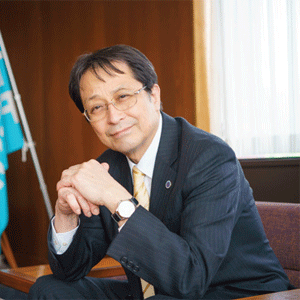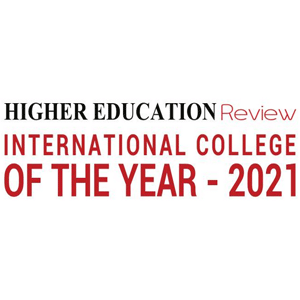University of Tsukuba: Striving To Create Unique And Internationally Competitive Atmosphere With Superlative Education And Facilities
By Kyosuke Nagata, President
Consistently ranked in the top 10 countries for education, Japan has always remained a major center of attraction for international students owing to its high educational standards and rich cultural heritage. Regarded as one of the premium education hubs of Japan, the University of Tsukuba is known for fostering innovation by adopting a comprehensive curriculum across more than 23 distinctive disciplines. The origin of the University of Tsukuba was the oldest higher education institution, Normal School founded by the Meuji government in 1872.
The youngest comprehensive national university in Japan established in October 1973, based on its predecessor schools, under a country-wide university reform plan, the University of Tsukuba has featured `Openness' with `New Systems for Education and Research' under a `New University Administration.' The University of Tsukuba is known for its strong focus on international studies, the comprehensive educational curriculum it offers, and 135 Olympic and para-Olympic medals. Striving to create a unique, active, and internationally competitive atmosphere with superlative education and research facilities, the university has witnessed three Nobel laureates as professors and presidents, playing an impeccable role in guiding the students to reach their full potential.
Breaking down the existing disciplinary barriers of Japanese education standards, the University of Tsukuba has emerged as a frontrunner in the university reform in Japan by introducing numerous new-age programs as its prime offerings. A highly internationalized University of Japan, the University of Tsukuba is known for holding the second-highest international student ratio in all of Japan owing to its highly specialized advanced curriculums. Apart from being a key provider of industry-specific courses of the current era, such as humanities, social sciences, engineering, medicine, business administration, and so on, the University also hosts a sturdy background in data science. As per a survey conducted by the Ministry of Education, Culture, Sports, Science and Technology, Japan, the University of Tsukuba seized its position amidst the top 11 institutes of Japan offering distinguished and excellent data science education.
"Being a typical research-oriented University, we are receiving quite an extensive cooperation from all the National Research Institute present in Tsukuba Science City. We know that every student is unique and that's why we let them explore the areas that appeal to them. After that, we assist them with the necessary training and internship programs to reach their desired goals. Also, we offer tons of English courses for Japanese students and Japanese courses for foreign students, to help them find jobs after graduation quite easily," quotes Kyosuke Nagata, President, University of Tsukuba.
Understanding the mindset of international students who often face difficulties in adjusting to the Japanese living standard, the University of Tsukuba has always been eager to ease out their pain by offering an apt support system. Apart from having technologically advanced dormitories for the students, the campus of the University of Tsukuba is equipped with contemporary infrastructural wonders, acting as a flawless student-magnet. "Japan has always demonstrated a welcoming attitude for the international students especially the Indians, who want to refurbish their academic talents.
To nurture the budding talents to excel in their respective fields, we have been looking for your talented international students, in particular from India. Maintaining a strong and cordial relationship with IIT Bombay as well as IIT Delhi, we have joined hands for numerous ongoing researches across both countries. Apart from promoting entrepreneurship and start-ups, which will be the major driving force of the industry in the future, we are refreshing the wisdom and talent of the current generation of students to help them evolve much prolifically," quotes Kyosuke Nagata.
Seamlessly functioning as a university that is open to all students within and outside of Japan, the university is gradually evolving as an organization in synchronization with the novel concepts of education and research, highly international in character, rich in diversity and flexibility and capable of dealing sensitively with the changes occurring in contemporary society. Ensuring all of its students with the opportunity to develop their individuality and skills through an education that is backed by cutting-edge research, the University of Tsukuba aims to be an open-minded university in all aspects.
The university aims to establish a free exchange and close relationships in both basic and applied sciences with educational and research organizations and academic communities in Japan and overseas, meanwhile pursuing education and research to cultivate men and women with creative intelligence and rich human qualities. "Our fundamental principle is to create a flexible education and research structure as well as a university system to meet the needs of the next generation. We aspire to be a comprehensive university, continuously meeting new challenges and developing new areas. The foremost mission of a university is to provide an environment that allows future leaders to realize their potential in full," concludes Kyosuke Nagata.
Tsukuba has emerged as a frontrunner in the university reform in Japan by introducing numerous new-age programs as its prime offerings.
The youngest comprehensive national university in Japan established in October 1973, based on its predecessor schools, under a country-wide university reform plan, the University of Tsukuba has featured `Openness' with `New Systems for Education and Research' under a `New University Administration.' The University of Tsukuba is known for its strong focus on international studies, the comprehensive educational curriculum it offers, and 135 Olympic and para-Olympic medals. Striving to create a unique, active, and internationally competitive atmosphere with superlative education and research facilities, the university has witnessed three Nobel laureates as professors and presidents, playing an impeccable role in guiding the students to reach their full potential.
Breaking down the existing disciplinary barriers of Japanese education standards, the University of Tsukuba has emerged as a frontrunner in the university reform in Japan by introducing numerous new-age programs as its prime offerings. A highly internationalized University of Japan, the University of Tsukuba is known for holding the second-highest international student ratio in all of Japan owing to its highly specialized advanced curriculums. Apart from being a key provider of industry-specific courses of the current era, such as humanities, social sciences, engineering, medicine, business administration, and so on, the University also hosts a sturdy background in data science. As per a survey conducted by the Ministry of Education, Culture, Sports, Science and Technology, Japan, the University of Tsukuba seized its position amidst the top 11 institutes of Japan offering distinguished and excellent data science education.
"Being a typical research-oriented University, we are receiving quite an extensive cooperation from all the National Research Institute present in Tsukuba Science City. We know that every student is unique and that's why we let them explore the areas that appeal to them. After that, we assist them with the necessary training and internship programs to reach their desired goals. Also, we offer tons of English courses for Japanese students and Japanese courses for foreign students, to help them find jobs after graduation quite easily," quotes Kyosuke Nagata, President, University of Tsukuba.
“Being a typical research-oriented University, we are receiving quite an extensive cooperation from all the National Research Institute present in Tsukuba Science City”
Refreshing Talent of Current Generation
Understanding the mindset of international students who often face difficulties in adjusting to the Japanese living standard, the University of Tsukuba has always been eager to ease out their pain by offering an apt support system. Apart from having technologically advanced dormitories for the students, the campus of the University of Tsukuba is equipped with contemporary infrastructural wonders, acting as a flawless student-magnet. "Japan has always demonstrated a welcoming attitude for the international students especially the Indians, who want to refurbish their academic talents.
To nurture the budding talents to excel in their respective fields, we have been looking for your talented international students, in particular from India. Maintaining a strong and cordial relationship with IIT Bombay as well as IIT Delhi, we have joined hands for numerous ongoing researches across both countries. Apart from promoting entrepreneurship and start-ups, which will be the major driving force of the industry in the future, we are refreshing the wisdom and talent of the current generation of students to help them evolve much prolifically," quotes Kyosuke Nagata.
Seamlessly functioning as a university that is open to all students within and outside of Japan, the university is gradually evolving as an organization in synchronization with the novel concepts of education and research, highly international in character, rich in diversity and flexibility and capable of dealing sensitively with the changes occurring in contemporary society. Ensuring all of its students with the opportunity to develop their individuality and skills through an education that is backed by cutting-edge research, the University of Tsukuba aims to be an open-minded university in all aspects.
The university aims to establish a free exchange and close relationships in both basic and applied sciences with educational and research organizations and academic communities in Japan and overseas, meanwhile pursuing education and research to cultivate men and women with creative intelligence and rich human qualities. "Our fundamental principle is to create a flexible education and research structure as well as a university system to meet the needs of the next generation. We aspire to be a comprehensive university, continuously meeting new challenges and developing new areas. The foremost mission of a university is to provide an environment that allows future leaders to realize their potential in full," concludes Kyosuke Nagata.
Kyosuke Nagata, President
Tsukuba has emerged as a frontrunner in the university reform in Japan by introducing numerous new-age programs as its prime offerings.


